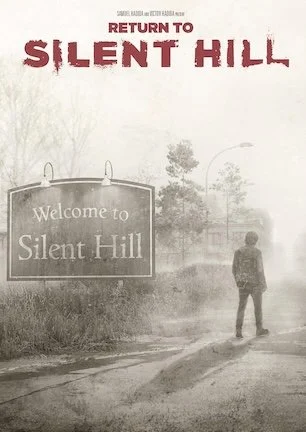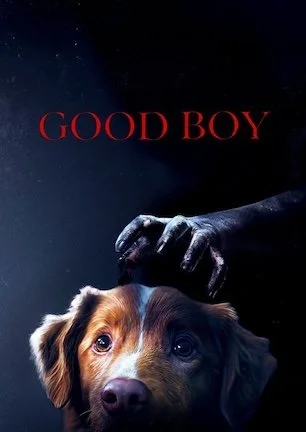Studio: Wild Eye Releasing
Director: Scott Patrick (Brett Kelly)
Writer: David A. Lloyd, John Migliore
Producer: Teresa Pike
Stars: Steph Goodwin, Zoe Towne, Robin Hodge, Christina Roman, Amy Osborne, John Migliore, Kylie Gough, Kyle Martellacci, Taryn Waldorf, Chad Walls, Peter Whittaker
Review Score:
Summary:
A flying ghost shark attacks police officers, teen hikers, and five friends after being accidentally summoned by a Ouija board.
Review:
In the event I am responsible, even partly or incidentally, I apologize for any role I may have had in “Ouija Shark’s” birth. See, back in April 2018 I was idly musing about how indie horror overflowed with Ouija and shark flicks still trying to ride the fading waves brought on by the Blumhouse movies and “Sharknado” (review here). Accompanied by a collage of 21 posters, I tweeted, “horror has officially achieved peak Ouija and peak Shark. Fully expecting The Asylum and SyFy’s OUIJA SHARK in time for Halloween.”
It took until 2020, but my offhand riff about an unlikely crossover became a reality. It didn’t come from The Asylum or SyFy after all, but Wild Eye Releasing actually delivered a movie titled “Ouija Shark.”
Could my tweet have inadvertently willed the film into existence? That‘s probably giving me too much credit. I imagine I’m not the only person who noticed the surge in those two trends. The copyright also dates “Ouija Shark” to 2017, although the film’s online footprint doesn’t begin until three years later. What’s weirder is the lone piece of “trivia” on IMDb claims the movie “filmed in 2018 but sat unreleased for two years,” so who knows when the project came together.
I’m willing to take this as a case of parallel thinking anyway because this same filmmaking team came up with “Jurassic Shark” and “Raiders of the Lost Shark,” indicating trash movies inspired by dopey names appears to be their gimmick. Regardless, I felt oddly obligated to review “Ouija Shark” despite the trailer unmistakably screaming this was the type of disposable DIY-er I otherwise know better than to put in my eyeballs. I mean, I do know better and I still did it anyway.
I don’t know what to tell you about “Ouija Shark” that you haven’t already guessed based on its lowbrow origins. Yep, this is amateur hour from start to finish. Or in this case, amateur hour and ten minutes, with brevity being the film’s only mercy.
Brett Kelly directs “Ouija Shark” under the name Scott Patrick. Kelly’s alter ego doesn’t appear to be a secret. He has at least four other credits as Patrick, including “Raiders of the Lost Shark” but not “Jurassic Shark.” I wouldn’t want my real name on “Ouija Shark” either, though I don’t see the point of a pseudonym when everyone knows they’re the same person. There must be some reason why select projects get Scott Patrick while the rest get Brett Kelly. Then again, given how carelessly tossed together “Ouija Shark” is, assuming there’s a method to any of the madness might be a Grand Canyon-sized reach.
“Ouija Shark” stars no one you’ve ever heard of. Three of the five main women have no other acting credits and probably never will. The other two have mostly appeared in previous Brett Kelly projects. More than one of them accidentally glances directly into the camera. Some actors seem to be trying, but even this simple script proves to be way out of their league.
Everyone appears to be a touch too old for a lark like this too. Teens and college kids are expected to cut their teeth on homemade horror that’s cheap, easy, and sounds amusing when brainstorming silly ideas over beers. It seems strange that a cast with no real acting ambitions who are a decade past that stage were willing to give up an afternoon to make a backyard movie about a flying ghost shark. Not only that, Kelly/Patrick has 20 years of experience behind the camera on homegrown projects. Shouldn’t he be able to make something sharper than this even on accident by now?
Kelly/Patrick also serves as the cinematographer and editor. The only other crew credits are a production assistant and someone who supposedly did location sound. In case it wasn’t abundantly clear, we’re obviously dealing with a DTV movie that’s as micro-budget as they come.
I made the right call by not springing the extra buck for an HD rental because higher quality video could only make the movie worse. Numerous scenes appear to have been shot on a handheld phone, as it would take a drunken camera operator enduring an earthquake to make a shoulder-mounted rig this jittery. There doesn’t appear to be a single light source aside from the sun, saving the producer’s cash by completely eliminating electricity as a line item. The scarce score sounds like one guy with a keyboard. The shark looks like a crude hand puppet sculpted during a cartoon’s commercial break by my eight-year-old nephew.
Maybe, and this is a big maybe, but maybe if “Ouija Shark” consistently played to its camp appeal, it might have generated some ironic entertainment value. The movie only gives in to the absurdity of its concept down the home stretch. Jokes, or what passes for them at any rate, start sneaking into dialogue while performances suddenly get even hammier. Two-thirds into a film is too late to realize the wrong tone was set. Since so much of “Ouija Shark” features boringly long scenes of swimming, walking in the woods, and other nonsense of no narrative value, the film never develops a fun personality, only a flat one.
The small pinch of “Ouija Shark” that’s intentionally bad gets dominated by the Godzilla-sized portion that’s unintentionally awful. A movie about a killer ghost shark summoned by a Ouija board sounds like a goofily good time, but trust me that it isn’t. If you blind bought the film as a laugh for ‘Bad Movie Night’ with B-movie buddies, you’d cringe the entire time, feeling terrible about subjecting your friends to it.
Hopefully someone stops me if I ever get the urge to imagine a gag movie title on Twitter again. I can’t have another “Ouija Shark” weighing on my conscience, even if it wasn’t really my fault.
Review Score: 10






While the 110-minute runtime could use a trim to maintain more energy, “Redux Redux” is an easy recommend for anyone who enjoys low-key sci-fi.